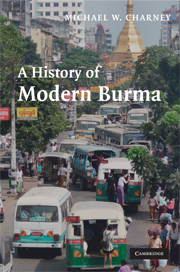Book contents
- Frontmatter
- Contents
- List of figures
- List of maps
- Chronology
- Abbreviations
- Introduction
- Chapter 1 Burma under colonial rule
- Chapter 2 The colonial center
- chapter 3 Self-government without independence, 1937–1947
- Chapter 4 The democratic experiment, 1948–1958
- Chapter 5 Dress rehearsals, 1958–1962
- Chapter 6 The Revolutionary Council
- Chapter 7 The BSPP years
- Chapter 8 Toward democracy, 1988–1990
- Chapter 9 Perpetual delay, 1990 to the present
- Conclusion
- Notes
- Readings
- Index
Chapter 6 - The Revolutionary Council
Published online by Cambridge University Press: 05 February 2015
- Frontmatter
- Contents
- List of figures
- List of maps
- Chronology
- Abbreviations
- Introduction
- Chapter 1 Burma under colonial rule
- Chapter 2 The colonial center
- chapter 3 Self-government without independence, 1937–1947
- Chapter 4 The democratic experiment, 1948–1958
- Chapter 5 Dress rehearsals, 1958–1962
- Chapter 6 The Revolutionary Council
- Chapter 7 The BSPP years
- Chapter 8 Toward democracy, 1988–1990
- Chapter 9 Perpetual delay, 1990 to the present
- Conclusion
- Notes
- Readings
- Index
Summary
There is a tendency to treat the Revolutionary Council period, from 1962, and the Burma Socialist Program Party (BSPP) years that followed it, as one entity. This has been partly for reasons of simplicity. The point at which the Revolutionary Council ended and the BSPP Government began is hazy, due to the myriad political steps that were involved in the process, including the opening up of the BSPP for mass membership in 1971 and the promulgation of a new constitution in 1974. The most important change, however, occurred in 1972 when the Revolutionary Council was transformed into a civilian body and a new administrative system was established. Another reason for the presumed continuity was that the main leaders of the Revolutionary Council remained the ruling cohort of the BSPP government. In an arguable sense, then, the establishment of the BSPP government meant no real change in the political leadership of the country. Finally, it is convenient to consider 1962 as the beginning of a single period of military rule as it adds weight to understandable assertions of the overlong tenure of military men at the helm of state and their responsibility for the country’s economic woes since the Nu years.
Nevertheless, there are equally sound reasons for considering the Revolutionary Council era separately. One is that it was a period when the final fate of the country remained unclear, when policies remained unfixed in one direction or another, and in which it was not yet clear to anyone, including Ne Win and his friends, if they would continue to hold on to power (in which case the Revolutionary Council would have been viewed merely as a second caretaker regime). A political compromise with Nu and other democratic leaders was still a possibility, though admittedly a distant one. By contrast, Burma under the BSPP government would be without the possibility of alternative paths, so much so that it took a popular revolution to end it.
- Type
- Chapter
- Information
- A History of Modern Burma , pp. 107 - 132Publisher: Cambridge University PressPrint publication year: 2009



